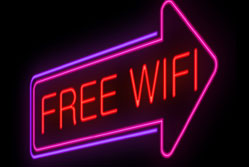Watch out for that free Wi-Fi
Watch out for that free Wi-Fi
 Free Wi-Fi seems like one of the great perks of the 21st century. In pubs and cafes in towns and cities across the UK, you can get online for nowt.
Free Wi-Fi seems like one of the great perks of the 21st century. In pubs and cafes in towns and cities across the UK, you can get online for nowt.
But now Europol — the EU’s law enforcement agency — is warning that using free Wi-Fi could be much riskier than we’ve realised.
In short, each time you connect to a public network, you could be playing a kind of Russian roulette with the data you send over the airwaves.
The rogue Wi-Fi network problem
Cybercriminals and hackers have spotted that we’re hooked on the convenience of free Wi-Fi. What’s more, they know most of us are accustomed to connecting without giving a thought to security. And they’re taking advantage.
A typical attack is for a hacker to set up a rogue network. They give it the same name and password (if applicable) as a legitimate network nearby.
For instance, a criminal might set up ‘John’s Café Wi-Fi’ near to John’s Café. When an unsuspecting punter connects, the attacker can intercept all the data that gets sent and received.
Sensitive files and information sent by email, personal data entered into website forms … it’s all there for them to harvest and use.
This isn’t a particularly clever or novel trick. But it works. Next time you’re connecting to a network in a public place, can you be sure it is what you think it is?
How to stay safe from Wi-Fi attacks
It can be difficult to be 100% sure that you’re safe when you use public Wi-Fi. And so the best way to protect your data is to not send or receive sensitive or private data while using it.
That’s easier said than done. One of the most popular uses for Wi-Fi is catching up on email, which can contain all kinds of data that’s valuable to hackers.
However, it’s definitely a good idea to think twice before entering your online banking details or other sensitive login details.
Being on a secure website (indicated by https:// and a padlock in your web browser) does offer some protection, but hackers can still use a technique called sslstrip to intercept your data if they really want.
The safest option is to connect via a virtual private network (VPN), which creates a secure tunnel through which your data passes. You can purchase VPN access from companies like Hotspot Shield — there’s a good explanation and some reviews of VPNs over on the PC Advisor website.




Comments
Add a comment